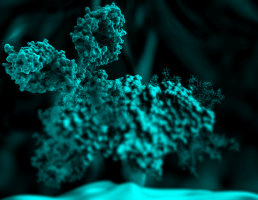
An experimental antibody treatment decreased by half the number of cancer stem cells that drive the growth of tumours in nearly all patients with multiple myeloma, a cancer of the bone marrow and bone tissue, according to results of a preliminary clinical trial led by Johns Hopkins Kimmel Cancer Center scientists.
The antibody, called Medi-551, was tested in 15 newly diagnosed patients with multiple myeloma who also received a monthly regimen of lenalidomide and dexamethasone -- already approved chemotherapy drugs that are often prescribed to treat multiple myeloma.
The scientists presented their findings at the American Association for Cancer Research (AACR) Annual Meeting 2016 in New Orleans (abstract CT102).
The researchers, led by myeloma experts William Matsui, M.D., and Carol Ann Huff, M.D., measured the impact of the drugs on cancer stem cells by counting the stem cells in bone marrow and blood samples drawn from the patients at several points throughout the seven-month study, which ended in March 2016.
Bone marrow-derived cancer stem cells at first increased by an average of 2.5-fold in the patients after two cycles of lenalidomide and dexamethasone alone.
After MEDI-551 was added in the third and fourth months of treatment, the number of cancer stem cells decreased by half, on average, in 14 of the 15 patients.
By contrast, five newly diagnosed multiple myeloma patients who did not receive the extra antibody treatment had their cancer stem cell numbers swell 9.3-fold after an average of four months' treatment with the other two drugs.
There were no serious adverse side effects among the patients in the study of the antibody.
Matsui and Huff are part of the Johns Hopkins research team that in 2002 was among the first to identify and isolate cancer stem cells in multiple myeloma, which is diagnosed in approximately 30,000 people in the U.S. annually.
Their subsequent research showed how these cancer stem cells contribute to relapse in patients with multiple myeloma, and the scientists have been looking for new ways to target these cells with treatments that can halt their ability to create mature tumour cells and trigger relapse.
The antibody MEDI-551 targets a specific protein called CD19 found on the surface of multiple myeloma cancer stem cells, explains Matsui.
"We chose to carry out this clinical trial in newly diagnosed patients because our original data showed that CD19 was almost always expressed by myeloma stem cells in these patients, whereas we don't know if that is the case in more advanced patients," he says.
The researchers also tested two different ways to measure cancer stem cells in patients: in tissue samples aspirated from bone marrow and in blood drawn from the patients throughout the study.
"We wanted to see if these two assays gave similar results, and in this clinical trial, they were almost identical," Huff says. "Since it is much easier to draw blood than bone marrow from our patients, we think that we can primarily use blood to track multiple myeloma stem cells in the future."
Although most of the patients experienced a decrease in multiple myeloma cancer stem cells after three doses of MEDI-551, these stem cells increased in two of the patients, each of who had their cancer grow or spread during the course of the study.
Matsui, Huff and their colleagues plan to conduct further studies to determine the long-term impact of the antibody treatment in patients with multiple myeloma and to find out how the antibody might work in combination with other treatments.
"In other studies at Johns Hopkins, we have found that antibody therapies can work much better after a bone marrow transplant, especially allogeneic transplants, where patients receive bone marrow cells donated from a relative," says Matsui.
Source: Johns Hopkins Medicine